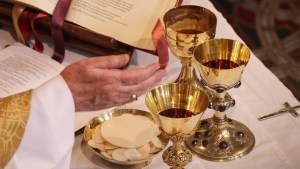The Thanksgiving holiday was meant to be a day when families would gather together and give thanks to God for the abundant harvest of the past year.
It is a day that recognizes God’s divine providence and how he provides for each of us, giving us precisely what we need.
Yet, we too often forget the role God has in our daily lives and we frequently forget to ask God for our daily bread.
Give us this day our daily bread
St. John Paul II reflected on this simple truth in an Angelus message in 2001:
At the moment of the Offertory at Mass, the Christian community gives thanks to the Lord, God of the universe, from whose goodness we receive the bread and wine destined to become the Body and Blood of Christ. Today’s celebration [of Thanksgiving] focuses on this dimension of offering, inviting us to remember that divine Providence is the first source of life and well-being.
He further links the Thanksgiving holiday to the Lord’s Prayer:
“Give us this day our daily bread “. When teaching this prayer to the disciples, Christ asked them to trust in the goodness of God the Father, who rejoices to give all creatures, especially human beings, what is necessary for life. At the same time, having us say “today” and “daily” reminds us that this gift must not be taken for granted, but must always be asked for and received in a spirit of thanksgiving.
Whenever we pray the Our Father, we should pray with a trust in God that he will provide for our needs, according to his will.
Not only will God provide for our needs, but we also need to be conscious of the needs of others, as St. John Paul II points out:
Moreover, it is important that Christ taught us to ask for “our” bread, and not that each one ask for “his” own. This means that children of the same Father are co-responsible for the “bread” of all, so that everyone may live in dignity and together with the others thank the Lord.
As we celebrate Thanksgiving, may we never miss an opportunity to be thankful to God and to always turn to him for our daily needs.



